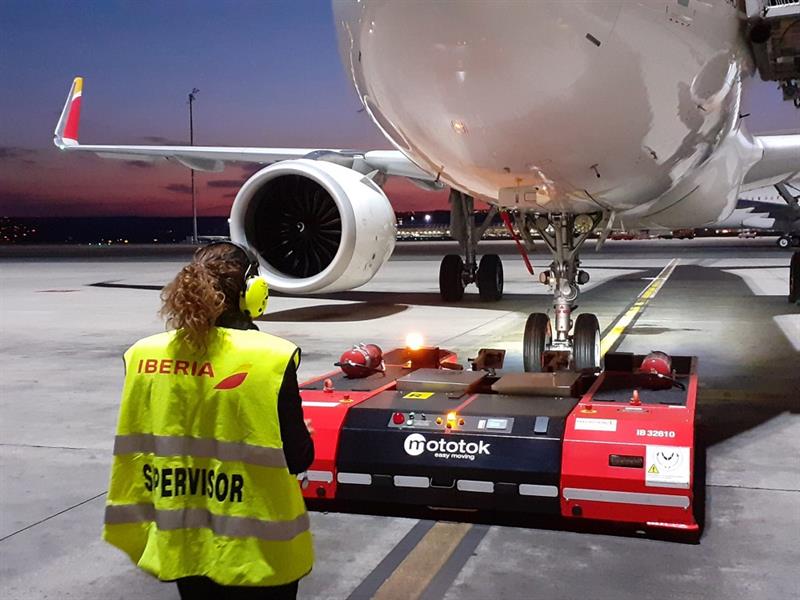
Aviation is looking for ways to improve its environmental impact, and IBAS has taken delivery of eight electric Mototok pushbacks, four at Madrid Barajas Airport and the other four are at Barcelona El-Prat.
As part of its electrification programme, IBAS plans to have 30 electric pushbacks at its airports in the coming years.
Last summer IBAS conducted 3,000 pushbacks using the Mototok Spacer 8600 in Madrid and Barcelona and will analyse traffic conditions and the Covid situation to assess rolling them out across its network of 29 airports.
Enrique Robledo, IBAS Director of Madrid Barajas Airport said when they were looking for volunteers, there were more applicants than places. In the initial phase, this is key because eager and motivated staff can act as ambassadors.
He said: “This was key for this initial phase where you need highly motivated people, not only to help in streamlining processes and technology but also to build an ambassador team that would engage the rest of the staff for subsequent trainings.”
Robledo added: “The experience with the training shows that the equipment is easy to use from the beginning to all people and from there, you will need to customise the length of the on the job training until each individual feels psychologically confident to do the task by their own.”
Staff in Barcelona were eager to try the new product, according to Antonio Rodriguez, IBAS Head of Barcelona-El Prat, who said they welcomed the new product.
He said: “During the training on a mock-up at our training centre, all the staff were greatly surprised that they were so easy to use. They said, in their own words: ‘It’s like playing on a PlayStation,’ this made them feel very confident from the very first moment.”
Trainers in Barcelona were ambassadors, supporting communications and getting their colleagues ready for the new product, said Rodriguez. The lack of noise compared to older pushbacks was also appreciated by staff.
He said: “Being able to provide more flexibility to operate, supporting conventional pushback operations during peaks with this new equipment has been key for all staff engagement.”
Reduced airport traffic caused by the pandemic also made it easier to train staff, something which was welcomed in Madrid, said Robledo.
He said: “There was a practical element here as the pandemic not only reduced activity but also changed the departure hourly distribution, generating many unproductive hours that could be used for training.”
Rodriguez agreed, saying that the crisis meant the aviation industry had to look at reducing costs and reconsidering working methods.
“For people working in airports, the image of empty terminals and the lack of aircraft has been very complicated to manage, so having new projects and challenges during those moments have undoubtedly favoured the success of the deployment as cultural change around these processes are absolutely essential,” he commented.
One lesson Robledo and the team learnt was that the infrastructure needed depends on the airport set up and type of traffic. Madrid required more extensive new infrastructure than Barcelona due to its configuration and existing infrastructure, said Robledo.
He added: “The fact that a type of hub operation demands peaks of aircraft departing at the same time, requires a higher concentration of equipment per stand to be able to move quickly from one aircraft to the next departure.”
In Madrid, chargers are located on every second bridge in the selected area and in Barcelona, they are located at every third bridge. The airport authority in Barcelona has been supportive, said Rodriguez, installing 14 chargers.
IBAS already has 100 electric GSE, and Rodriguez said that customers are increasingly demanding evidence that the company is serious about sustainability. Tests are being carried out on other electric vehicles, such as buses and starter units in Barcelona.
He said: “At IBAS there is a long-held strong commitment to sustainability, through fuel and emission control as well as the electrification of our GSE fleet.”







